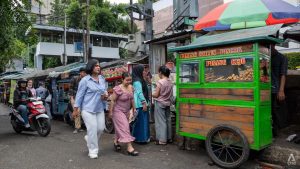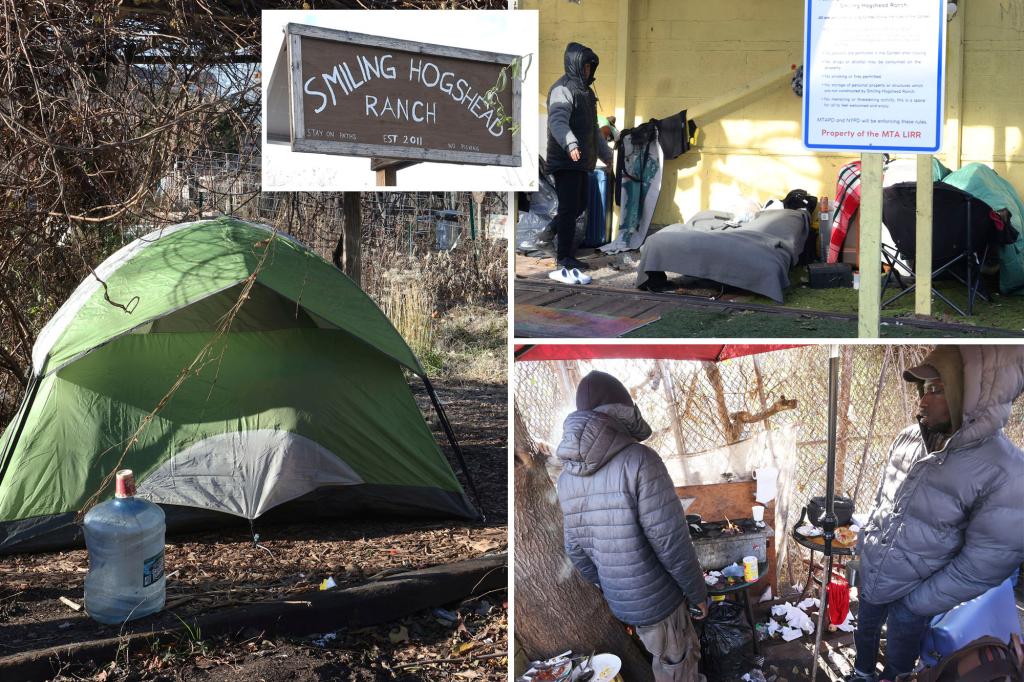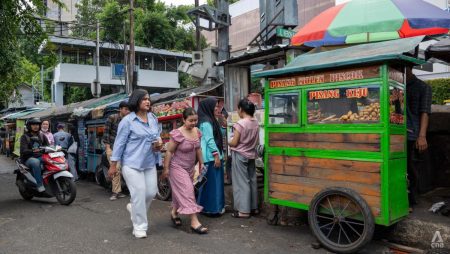The Smiling Hogshead Ranch, a community garden nestled on abandoned MTA-owned railway tracks in Long Island City, Queens, has become an unintended haven for migrants seeking refuge from the overflowing nearby Austell Place shelter. What was once a vibrant greenspace teeming with life and community activity is now littered with suitcases, discarded belongings, and human waste, a stark testament to the city’s ongoing migrant crisis. The influx of individuals seeking shelter has pushed the garden to the brink of eviction by the MTA, raising concerns about responsibility and the complex interplay between public institutions, volunteer organizations, and vulnerable populations.
The garden’s operators, a small volunteer-based group, find themselves caught in a difficult situation. They lack the resources to provide 24/7 security and manage the growing encampment, yet they also feel a sense of responsibility for the migrants who have nowhere else to go. The MTA, as the property owner, has been called upon to intervene but the response has been limited and often redirects the issue back to homeless services, leading to a cycle of inaction. The garden operators argue that the MTA, as a large public institution, bears a greater responsibility to address the situation, especially given its own police force and resources. The current arrangement leaves the volunteer group feeling overwhelmed and ill-equipped to handle the escalating crisis.
The migrants themselves, hailing from countries like Venezuela, Ecuador, Peru, Senegal, and Mauritania, offer a glimpse into the human cost of the crisis. Many are working odd jobs, selling drinks on the street or taking other informal employment to survive. They seek shelter in the garden out of necessity, often turned away from the Austell Place shelter due to its strict operating hours or capacity limitations. Some have established semi-permanent residences within the garden, creating makeshift beds and storage areas for their belongings. They cook their meals there, finding a temporary sense of community and respite amidst their precarious circumstances. Their stories underscore the desperation and resilience of individuals navigating the challenges of migration and homelessness in a new city.
The situation at Smiling Hogshead Ranch deteriorated further when Mayor Eric Adams began enforcing 60-day shelter limits, forcing more individuals onto the streets and into unconventional spaces like the garden. The garden’s operators have repeatedly contacted the MTA, logging numerous 311 complaints about encampments, illegal dumping, and sanitation issues. However, their efforts have yielded minimal results. The MTA’s single significant action involved demolishing a makeshift shelter on the garden’s periphery, a move that inadvertently destroyed a community stage and only pushed the migrant population deeper into the garden itself, further impacting the remaining green space.
The MTA’s threatened eviction of the garden highlighted the precariousness of the situation. While the agency cited health and safety concerns, it remained unclear whether the migrant presence or the resulting unsanitary conditions were the primary catalyst. The eviction notice, later rescinded upon the garden’s agreement to post signage prohibiting fires, storage, and nighttime access, underscores the tension between the MTA’s responsibility as a property owner and the garden’s role as a community space grappling with the complexities of the migrant crisis. The garden operators, however, remain skeptical that signage alone will effectively address the underlying issues.
The human stories emerging from Smiling Hogshead Ranch paint a picture of resilience and desperation. Migrants like Ahmedu and Ahmed from Mauritania, who find solace in a cup of hot tea shared in the garden’s sandbox, express a desire for peaceful existence and the opportunity to work. Their presence in the garden, while disruptive to its intended purpose, reflects the broader challenges facing cities grappling with migrant influxes and limited shelter capacity. Their stories highlight the need for comprehensive solutions that address both the immediate needs of vulnerable populations and the long-term challenges of integration and support. The Smiling Hogshead Ranch, caught in the crosscurrents of this crisis, serves as a microcosm of the larger societal struggle to balance compassion with practical realities.










